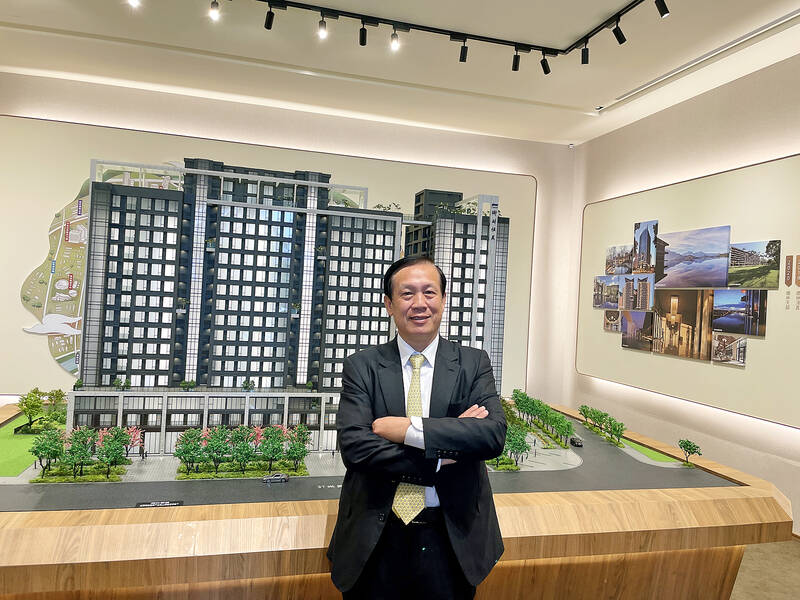Shining Group (鄉林集團) said it is looking to set up a second holiday resort in Taiwan, while it expects business to improve in China after the country relaxed COVID-19 curbs.
The Taichung-based conglomerate — whose business interests span property development and operating luxury hotels, including The Lalu (涵碧樓) in Nantou County and resorts of the same name in China — intends to set up a hotel in Yunlin County with the same business concept as the Nantou facility, Shining chairman Lai Cheng-i (賴正鎰) told a media briefing in Taipei on Wednesday.
The resort near Sun Moon Lake (日月潭) posted robust occupancy rates and kept its prices stable during the COVID-19 pandemic, profiting from health and wellness trends, he said.

Photo: Hsu Yi-ping, Taipei Times
Sales at its The Lalu hotels in China’s Qingdao and Nanjing recovered quickly after Beijing abandoned its “zero COVID-19” policy last month, Lai said, adding that the two facilities are fully booked over the Lunar New Year holiday.
Lai said the group’s hospitality revenue might this year return to the pre-pandemic levels.
Unique resort facilities in Taiwan have proved popular and profitable despite their less convenient locations, Shining manager Liu An-kang (劉安康) said, citing The Bal’s Villas (牛眠埔里) in Nantou County as an example.
The group has also tapped into the property management business by leasing unsold apartments in Taipei’s Shilin District (士林) to health and beauty service providers to generate rental income, Liu said.
Shining Building Business Co (鄉林建設), the group’s main arm, would continue to focus on urban renewal and joint development projects despite unfavorable laws that ban transfers of presale property and require legal entities to obtain permission before starting real-estate ventures, he said.
The legal revisions would scare away property investors and small developers, as home buyers would have to hold on to their properties for a long time to avoid punitive taxes, he added.
The ban on transfers of presale property could discourage urban renewal projects, as cash-stressed owners would not be allowed to find successors or partners after seeking in vain to integrate participants, Lai said.
It is time-consuming to bring all owners of land plots and old houses on board for urban renewal projects, he said, adding that initiators of such projects frequently bow out to cut losses.
The unfavorable legislation and economic uncertainty might cause presale property sales to shrink to NT$1.6 trillion (US$52.53 billion) this year, from NT$2 trillion last year, Lai said.

TAKING STOCK: A Taiwanese cookware firm in Vietnam urged customers to assess inventory or place orders early so shipments can reach the US while tariffs are paused Taiwanese businesses in Vietnam are exploring alternatives after the White House imposed a 46 percent import duty on Vietnamese goods, following US President Donald Trump’s announcement of “reciprocal” tariffs on the US’ trading partners. Lo Shih-liang (羅世良), chairman of Brico Industry Co (裕茂工業), a Taiwanese company that manufactures cast iron cookware and stove components in Vietnam, said that more than 40 percent of his business was tied to the US market, describing the constant US policy shifts as an emotional roller coaster. “I work during the day and stay up all night watching the news. I’ve been following US news until 3am

UNCERTAINTY: Innolux activated a stringent supply chain management mechanism, as it did during the COVID-19 pandemic, to ensure optimal inventory levels for customers Flat-panel display makers AUO Corp (友達) and Innolux Corp (群創) yesterday said that about 12 to 20 percent of their display business is at risk of potential US tariffs and that they would relocate production or shipment destinations to mitigate the levies’ effects. US tariffs would have a direct impact of US$200 million on AUO’s revenue, company chairman Paul Peng (彭雙浪) told reporters on the sidelines of the Touch Taiwan trade show in Taipei yesterday. That would make up about 12 percent of the company’s overall revenue. To cope with the tariff uncertainty, AUO plans to allocate its production to manufacturing facilities in

Six years ago, LVMH’s billionaire CEO Bernard Arnault and US President Donald Trump cut the blue ribbon on a factory in rural Texas that would make designer handbags for Louis Vuitton, one of the world’s best-known luxury brands. However, since the high-profile opening, the factory has faced a host of problems limiting production, 11 former Louis Vuitton employees said. The site has consistently ranked among the worst-performing for Louis Vuitton globally, “significantly” underperforming other facilities, said three former Louis Vuitton workers and a senior industry source, who cited internal rankings shared with staff. The plant’s problems — which have not

COLLABORATION: Given Taiwan’s key position in global supply chains, the US firm is discussing strategies with local partners and clients to deal with global uncertainties Advanced Micro Devices Inc (AMD) yesterday said it is meeting with local ecosystem partners, including Taiwan Semiconductor Manufacturing Co (TSMC, 台積電), to discuss strategies, including long-term manufacturing, to navigate uncertainties such as US tariffs, as Taiwan occupies an important position in global supply chains. AMD chief executive officer Lisa Su (蘇姿丰) told reporters that Taiwan is an important part of the chip designer’s ecosystem and she is discussing with partners and customers in Taiwan to forge strong collaborations on different areas during this critical period. AMD has just become the first artificial-intelligence (AI) server chip customer of TSMC to utilize its advanced